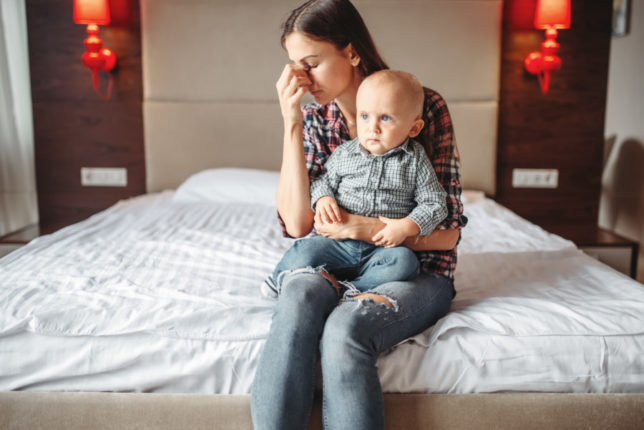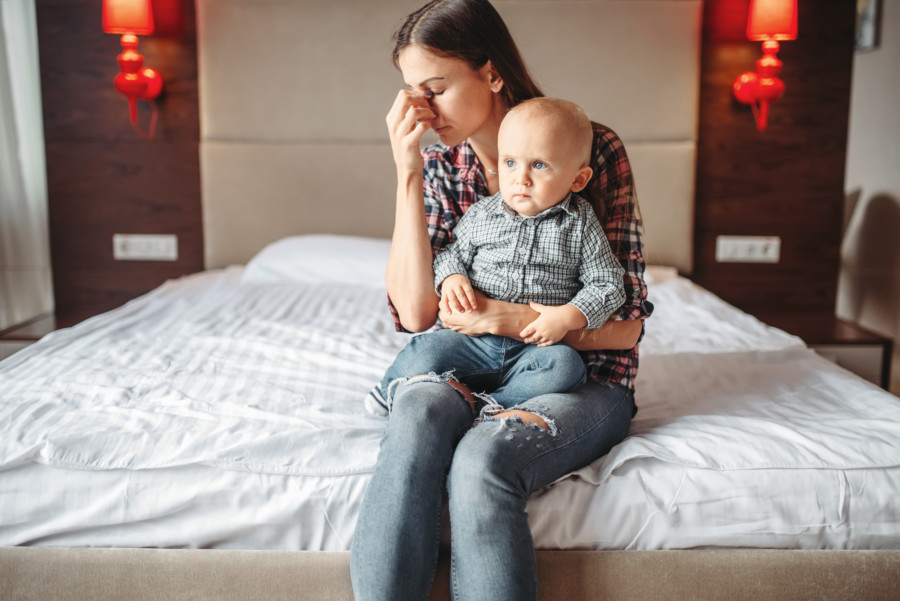Having a baby is a life-changing, overwhelming and exciting time, however, across the UK, at least 1 in 10 women is thought to experience postnatal depression (PND) after giving birth. But this figure could be even higher, as many women often don’t ask for help or tell others how they’re really feeling. Here, CABA, the wellbeing charity, explore some of the symptoms and options available to support new parents.

Prenatal depression
It’s possible for expectant mothers to suffer from depression during their pregnancy, this is referred to as prenatal or antenatal depression. During pregnancy, the amount of hormones, oestrogen and progesterone, in a woman’s body surges in volume by up to 50 times. This sudden increase should create a sense of wellbeing or maternal ‘bloom’. But this isn’t always the case for all expectant mothers. Pregnancy can be an incredibly emotional experience for women, and the additional hormones in their body can leave them struggling to sleep, as well as feeling nauseous for days on end, which can result in a low mood and sadness.
Baby blues
After the birth, often at around day 3, it’s common for women to develop the baby blues, which can leave the new mother feeling weepy, anxious, tense and generally a bit down. Tiredness and adjusting to a new routine are just some of the factors that can cause this. These mild and quite normal symptoms are not to be confused with postnatal depression (PND) and will often disappear within a couple of weeks.
Postnatal depression
If these symptoms persist, the mother could be suffering from postnatal depression, which usually starts during the 1st month after childbirth (though it can be triggered several months later). The symptoms – many of which are similar to those of ordinary depression – last longer than the baby blues.
If a loved one or someone close to you has recently had a baby, here’s a list of the symptoms associated with postnatal depression to look out for:
- Inability to sleep properly
- Low energy, feelings of exhaustion
- Lack of confidence in looking after your baby
- Loss of appetite or increased appetite (comfort eating)
- Poor concentration, feelings of confusion
- Lack of interest in sex or your partner
- Loss of interest in everything, an inability to feel pleasure or enjoyment
- Feelings of anxiety, irritability or anger
- Low mood or mood swings
- Feelings of sadness or despair
- Crying a lot
- Feelings of worthlessness, hopelessness or guilt
- Alarming thoughts (e.g. harming your baby or suicide)
These aren’t all of the symptoms associated with PND, and they can be normal emotions women experience after giving birth. However, if these symptoms persist and build up, it could be more than the baby blues. This can happen so gradually that some mothers may not even realise that they are suffering from PND.
It’s also worth remembering that it’s not just women who are affected. Research has found up to 1 in 15 new fathers have also suffered from depression after their partner has given birth and suffer from symptoms similar to those that women face.
It’s important for new parents, both mothers and fathers, to feel supported, so try to check in on them as much as possible. If you’re concerned about a loved one who may be suffering from these symptoms, here are a few things you can do to help:
Help out where you can
Reassuring them that it will get better will go a long way in helping improve their mental state, as will offering to help with the baby. Offer the mother or both parents the chance to have some space away from the baby, even if it’s just for a quick bath or a trip to the shops, whilst you take care of the baby. It will help provide some much needed ‘me’ or ‘us’ time.
Speak to someone
If you think someone you know is showing any of the signs of PND, suggest they seek help, as it will not only allow them to recover more quickly, but could also improve their relationships with their partners and families, as well as their baby. It’s also important to remind new parents that admitting you’re feeling depressed isn’t a sign of weakness or failure, and it can happen to anyone.
Get professional help
Advise them to visit their GP or health visitor. They will be able to provide expert care and tailor suitable treatment. The type of treatment they may be offered will depend on a number of things, including what symptoms they have been demonstrating (and how severe they are), whether they’ve had depression or other mental health problems before and what type of treatment they would prefer. This could include the following: counselling, CBT or antidepressants.
If a friend, family member or even a colleague is pregnant or has recently had a baby, bear these symptoms in mind and find ways to support and maintain a clear line of helpful conversation with regular check-ins. It’s important to remind them that there is support out there, and that it will get easier.
About CABA
CABA (Chartered Accountants Benevolent Association) supports chartered accountants’ wellbeing by providing support, information and resources to members of the ICAEW community. Find out more at www.caba.org.uk

